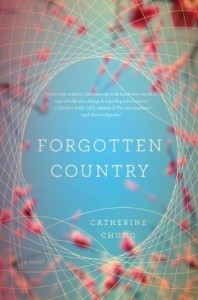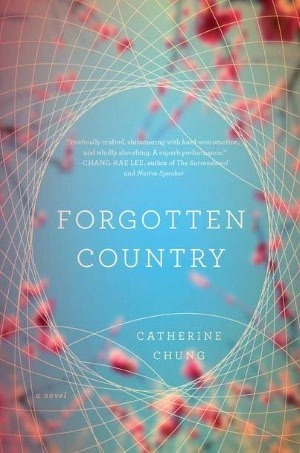by Gauri Trivedi
[box]‘Move aside Jhumpa Lahiri, Ms. Chung is here. Or is she?’ wonders Gauri Trivedi in this book review of Forgotten Country by Catherine Chung. Rich in descriptions about Korean culture, the book however misses one key aspect Gauri considers vital to books about the life of immigrants. Read on to find out more.[/box]Disclaimer – I apologise for this piece of work extending beyond being the review of a single book by an author. The comparison with another author whose forte is very much this kind of stories has been deliberate.
The emotions of an immigrant have always been worthy of a book, but up until a few years ago, not many people thought they would make an interesting read. These days though, it is the hottest thing you can write about. As a whole new generation of Asians tries to fit into a society they were born into (not the same as their parents) and adapt to a culture very different from what their ancestors followed, the account of their times and turbulence has the potential to inspire many a writers and readers.
 “Forgotten Country” by Catherine Chung builds on this premise set by a second generation American- Korean narrator who leads us through her family matters, illnesses, sibling bonds and heritage. What is impressive about this debut author is the detail and finesse that comes across in the representation of her birth country and its traditions. What is not so interesting is the heady mix of too many things thrown in together. The book succeeds in arousing appropriate sentiments in bits and pieces but overall it fails to hold focus till the very end.
“Forgotten Country” by Catherine Chung builds on this premise set by a second generation American- Korean narrator who leads us through her family matters, illnesses, sibling bonds and heritage. What is impressive about this debut author is the detail and finesse that comes across in the representation of her birth country and its traditions. What is not so interesting is the heady mix of too many things thrown in together. The book succeeds in arousing appropriate sentiments in bits and pieces but overall it fails to hold focus till the very end.
And yes, don’t make the mistake of assuming you are picking up a mystery to read tonight just by the introduction which sounds as if the story is about Janie who goes looking for Hannah, her younger sister, and her trials along the way. Nope, Hannah isn’t missing in the practical sense of the word and Janie is one confused soul.
While I can relate somewhat with the “fitting in” part of this novel, I wish the author had made Janie’s character a little stronger and worth remembering, since she is the protagonist here, so to say. The backdrop of the novel keeps changing from emigrational issues to sibling rivalry to paternal obligations. And while the backdrop changes, the characters offer nothing new with its progression. Before I get to a synopsis of the book, let me give a brief milieu on what attracted me to picking up this book from the library shelf in the first place.
My introduction to the struggle of immigrants from the East to the West of the globe in the form of a read was with Jhumpa Lahiri’s first book of short stories “The Interpreter of Maladies.” “Namesake,” her second book, but her first full-fledged novel, explored and elaborated on the same idea and got itself many accolades. Her more recent “Unaccustomed Earth” (yet another collection of short stories) set the standard even higher and so now, whenever I pick up a book which expects me to relate to or empathize with Asians trying to build a life in the United States with the limitations they perceive themselves to have and the opportunities presented before them, it has to pass the acid test.
Jhumpa Lahiri always writes about the experiences of an Indian-American and the constant tug of war between the culture left behind and that of the adopted country, which is something I can identify with. But in spite of interpreting the same sentiment with different tales, there is something about her characters that touches my heart and her stories remain even after I finish with them.
“Forgotten Country,” on the other hand, has no such thing holding it together. I did not feel either for the head of the family who ultimately ends up at a place he desperately sought to flee or the sisters who seem to fight over petty things (as most sisters do) but not talk about life-altering incidents. The mother’ s role as the backbone of the family is not obvious at all, though she really is and one has to read between the lines to get a sense of her personality and sacrifices.
So, “Forgotten Country” is a novel through the words of Janie (Korean name Jeehyun), who sets out to look for her younger sister Hannah (Korean name Haejin) under pressure from her sick father who returns to Korea for treatment. Janie wants to follow her parents back to the native place, but before that she must confront Hannah who has disappeared abruptly. Having grown up hearing stories from her grandmother about losing sisters in the family, Janie, caught between fear and resent, takes up the assigned task and lands in Korea thereafter. Back to their roots, the change in the whole family is far-reaching and visible. Janie struggles with her role of the dutiful daughter when her parents refuse to fault Hannah, the rebel in the family, for her selfishness. The rest of the story then finishes in Korea with the readers getting a taste of its history, folklore and current state of existence.
I enjoyed reading the folklores and the country descriptions, and on that account Catherine Chung does not disappoint. Her details on the Korean culture and traditions make for an engrossing read and I would probably re-read those fascinating parts again, but her story about an ailing immigrant father , temperamentally different sisters and their travel back to the forgotten country did not pull me in. I finished reading it fast and superfluously.
A book on a subject as sensitive doesn’t always have to offer something new for a reader to enjoy its contents – what it needs is the emotional hook, a thread that immediately connects and stays. And though some may think it to be an unfair comparison, my Indian-origin counterpart does a much better job of it.
If you are looking for a simple, sensible read, this book may be a good use of your time, but if you are looking to get involved, this one’s not for you.
Gauri Trivedi is a former business law professional who makes the law at home these days. A Mom to two lovely daughters, her days are filled with constant learning and non- stop fun. All of her “mommy time” goes into writing and finds itself on her blog pages http://messyhomelovelykids.blogspot.com/ and http://pastaandparatha.blogspot.com/ and if she is not writing she is definitely reading something!
[facebook]Share[/facebook] [retweet]Tweet[/retweet]






loved this piece, Gauri! And inspite of your disclaimer, the comparison with another book/author in fact makes your review come alive and more helpful.